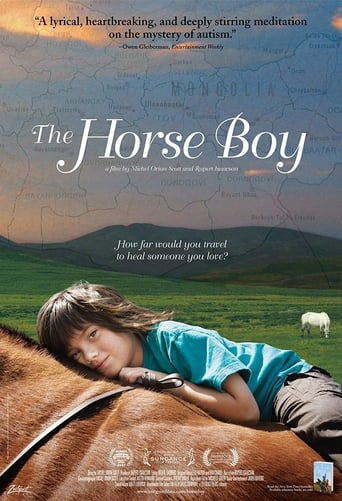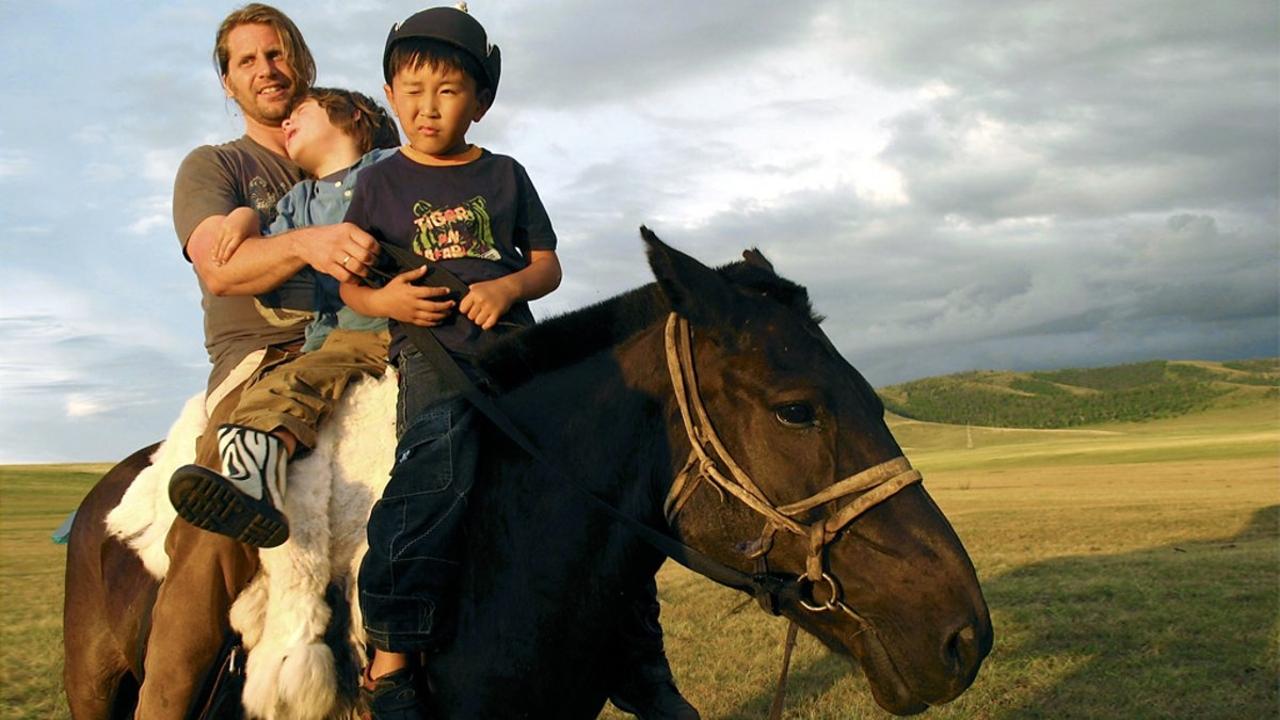mergen
please correct your information on this film, it's shot in Mongolia, not "Inner" Mongolia, a province of China. It's great that the Isaacson's can exploit their son's mental condition to make a movie, but spare us the New Age bull about shamanism. Both parents come across as so self-absorbed that it's no wonder that the kid has tantrums. I'm sure that the parents of children with mental disabilities must wonder how these unlikeable people get to perform for profit. Did Dr. Temple Grandin, Dr. Grinker and the other talking heads really know how silly this movie was going to be. Why did they lend their names and reputations to this?
chuck-526
As one who was already pretty knowledgeable about autism and familiar with Mongolian shamanism, I found these pictures extremely interesting. I haven't seen anything else remotely like this, with its very real scenes of inconsolable tantrums, outrageous drug regimens, traveling with incontinence, frazzled parents, unexpected fondnesses, blue flowers, and frame drums. Sure there's some selective editing going on, maybe even bordering on impressing an overall narrative on a series of events that didn't really flow so linearly. And sure some of the magic is a little hard for our Enlightenment rationalism to just observe without trying to impose some evaluation or judgment. Who cares? In any case gobs of reality show through, and they're much closer to being there than anything else you've ever seen (unless maybe you've watched a whole lot of research footage taken through a one-way mirror). Besides, it's so refreshing to me to finally see a film about autism that does _not_ include a hand flapping scene.I suspect some of the things in this film will seem pretty strange to most viewers, and others will only be grasped superficially; I can't say that for sure, because for me that viewing openness has already gone by and I can't get it back. I'm pretty sure though that enough will be familiar that viewers can retain their bearings - you needn't be concerned about being surreally swept away into some entirely different world.In one scene, some offhand explanatory remarks are offered while mixing the daily drug cocktail. Those comments will probably seem innocuous or unremarkable to most. But if you've already got a laundry list of (mostly wildly speculative) possible autism treatments in your head, it becomes clear they're already trying pretty much all of them.I know from other films that Mongolian scenery can be quite arresting. Some of the landscapes can be achingly beautiful, drawing you into a story all by themselves. But while the landscapes here are indeed striking, they're not drop-dead gorgeous. Maybe it's something about the hand-held camera format, or maybe it's some insufficiency of depth of focus, or maybe the resolution isn't quite high enough, or maybe the timing's too short, or... I'm not enough of a film-techno-freak to figure out why it is - I just know this film's less about the scenery than might be expected. .The philosophy is pretty light: nobody hits you over the head with anything, but in the end there's no question what the parents think either. Personally I already bought into the same philosophy the film presents: given the reality of people with "different" brain structures, societies might be better served by integrating them and making them productive than by trying to divide the "sick" and the "well" by too bright a line. And there's a difference --unfortunately too often lost-- between "curing autism" and "no longer driving folks nuts" (either by mitigating a few problem behaviors or by re-framing reactions to them so they lose their potency).To me, the part that best summarized the point of view was Dr. Temple Grandin reiterating her statement that if she could magically wave away her autism, she wouldn't. Although there's weirdness and uncomfortableness here, there's great value here too.This is not a film about the wider significance, possible epidemic, worldwide incidence, or current medical handling of autism. What it is about is one family that was given some lemons and how they're making lemonade. The biggest message I got was "pay attention!" Not everybody can --or should-- take their child to Mongolia. But everybody can try hard to understand and react to their child just as they really are, and that's what makes all the difference.
Shobwinny Desplain
Happiness, love and understanding!This film brings the beautiful message that the autistic can and will be cured by physical exercise. We all know it's true, and it is wonderful to see depicted in real life. The young boy's turnaround is nothing short of a miracle.The boy rides the horse. He commutes with the goat. He speaks to the chicken.You must take your children to Siberia. Autism, cancer, all will be cured by the horse and the goat. The chicken, not so much.Scientology? No, Science: Totally.
druid333-2
Rowan Isaacson is a four year-old boy,who has to live with a severe form of Autism. His parents are at wits end with his uncontrollable fits of screaming and crying and carrying on. During a walk with his Father (Rupert Isaacson),he bonds with an old horse,owned by their next door neighbour. Rupert gets the idea of taking his family to Mongolia to have his son healed by tribal Shamans (spiritual healers). It seems like the trip may be a failure from the start,but things begin to happen to Rowan (and the rest of the family,which also includes Rowan's Mother,Kristin Neff as well). First time director,Michel O.Scott (who also photographed & edited this documentary)went along to record the proceedings. The documentary video (shot on HD video)has some real nice scenic photography of the rugged,untamed countryside of Mongolia. We get to see some of the healing rituals of the tribal Shamans (which I really admired,as this culture is pretty much a mystery to most Westerners). This documentary isn't perfect,but still well worth checking out (my only two quirks I could have easily lived without are the occasional sojourns into toilet training,as Rowan had a real incontinence problem,which is rather graphically depicted on screen,plus the music score tended to feature some schmaltzy,New Age drone,rather than some Tuvan throat singers,which I would have much preferred). Not rated by the MPAA,but contains some brief strong language & some unnecessary gastric accidents from young Rowan that could have been left on the cutting room floor


 AD
AD


